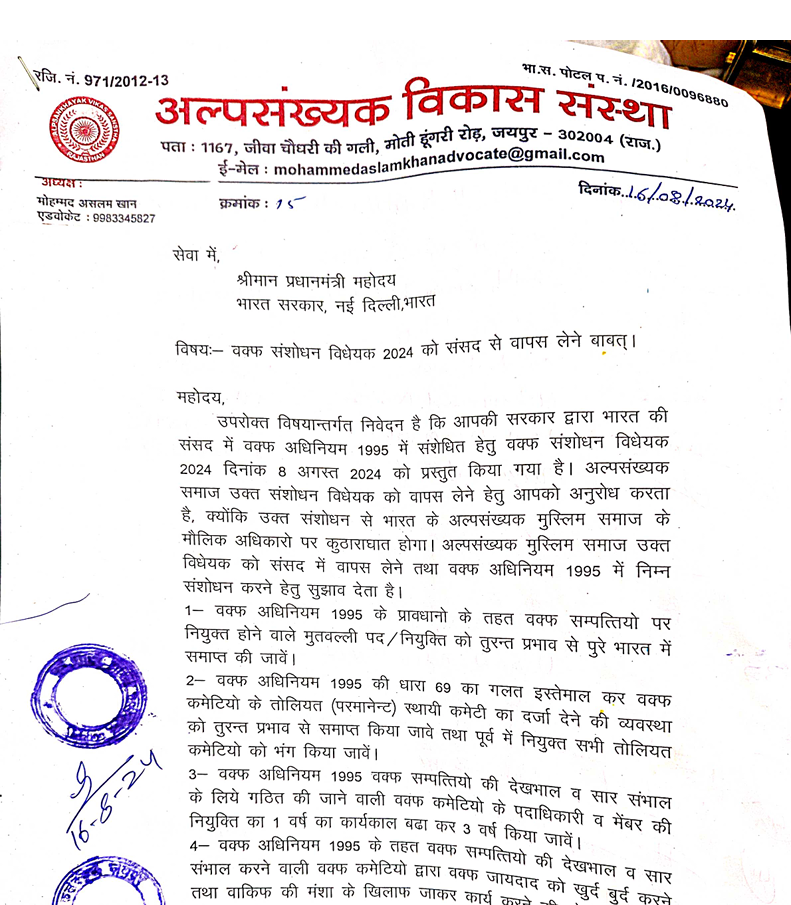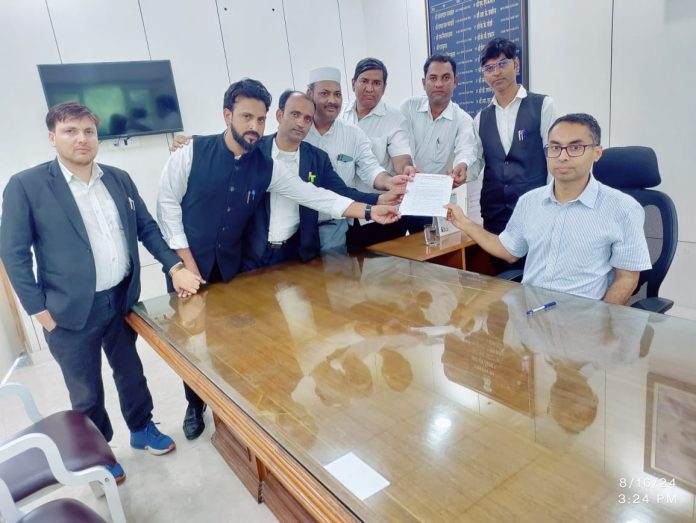– Raheem Khan
Jaipur, August 17: The Alpsankhyak Vikas Sanstha has submitted a memorandum to Prime Minister Narendra Modi, calling for the withdrawal of Waqf Amendment Bill 2024. The memorandum, delivered through Jaipur District Magistrate Prakash Rajpurohit on Friday, argues that the new amendment poses a significant threat to the fundamental rights of India’s minority Muslim community as enshrined in the Constitution.
The Bill, introduced by the Central Government in Parliament on 8 August 2024, seeks to amend the Waqf Act 1995. However, the minority community has expressed strong opposition, asserting that the proposed changes will undermine the constitutional rights of Muslims in India.
The Sanstha not only urged the withdrawal of the bill but also proposed a series of amendments to the Waqf Act 1995:

- Immediate abolition of the post/appointment of Mutawallis across India, as established under the Waqf Act 1995.
- Termination of the practice of granting permanent status (Toliyat) to Waqf Committees through the misuse of Section 69 of the Waqf Act 1995, and the dissolution of all previously appointed Toliyat
- Increase in the tenure of officers and members of Waqf Committees responsible for the care and maintenance of Waqf properties, extending from one year to three years.
- Introduction of a provision for ten years of rigorous imprisonment for Waqf Committees found guilty of destroying Waqf property or acting against the wishes of the Waqf under Waqf Act 1995.
- Requirement that Waqf Committee officials must have at least a 12th-grade education, with a stipulation that the chairman, officials, and members of the board should not be close relatives or friends. Violators should face a punishment of ten years of rigorous imprisonment.
- An order mandating Waqf Committees to bear the educational expenses of poor, orphaned, and economically disadvantaged Muslim children.
- A stipulation that Waqf Committee officers and members should be local residents with no criminal charges or cases related to land.
- A prohibition on Waqf Committee officers and members being close relatives of tenants residing on Waqf property.
- A requirement that those who maintain Waqf Mosques should be local residents and regular worshippers at the same mosque.
- An order directing Waqf Committees to provide financial assistance to widows, the poor, orphans, and economically disadvantaged women and girls living near Waqf properties, with detailed reports to be submitted to the Waqf Board along with audit reports.
The memorandum was endorsed by more than four dozen minority Muslim advocates, including Mohammad Aslam Khan Advocate, Mohammad Sajid Khan Advocate, Ikramullah Khan Advocate, Wasim Khan Advocate, Shahzad Mohammad Advocate, Mohammad Afzal Advocate, Akbar Ali Advocate, Imran Qureshi Advocate, Mohammad Rehan Advocate, Mohammad Abid Advocate, and Nafees Khan Advocate.
The Sanstha’s call to action reflects growing concerns within the Muslim community over the implications of the Bill, urging the government to reconsider and safeguard the rights of minority communities in India.




